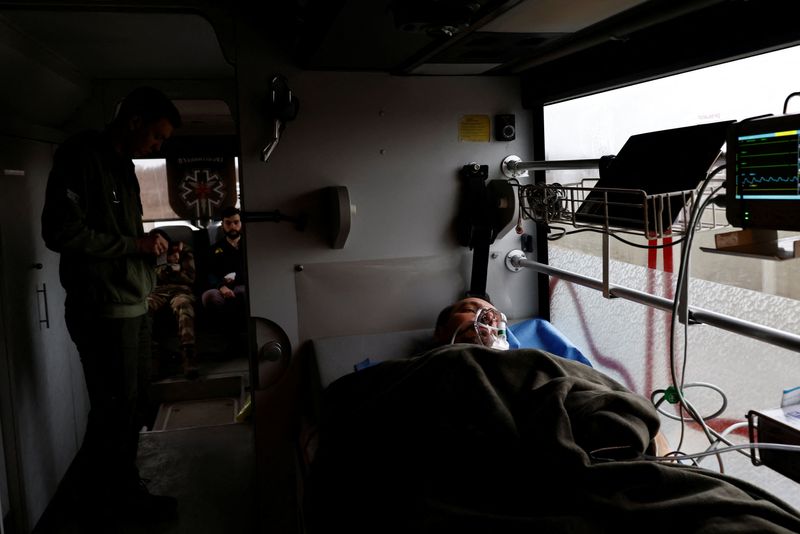(Reuters) - On a brightly painted bus that doubles as a high-tech medical evacuation unit in Ukraine, Stasik lies on one of six beds linked to blood pressure and heart monitors and intravenous drips for patients who need them.
The 45-year-old soldier, who gave only his first name, lost his right arm when a tank shell struck his position in fighting against Russian forces in eastern Ukraine.
The arm has been amputated and his condition is stable, and now he and nine other troops wounded in battle are on their way from a small hospital in a town that cannot be named for security reasons to a larger one in the central city of Dnipro.
There they will receive more advanced treatment and rehabilitation, but the journey would be perilous for some without a team of medics on hand to monitor their condition and administer painkillers and other drugs.
Six medics move up and down the narrow corridor between two rows of three beds that run the length of the bus, which is part of Ukraine's Hospitallers Medical Battalion that evacuates troops across Ukraine. Four more wounded sit at the back.
"This is really the start of something great," said Andrii Voloshin, 23, referring to the "Avstriika Bus" - named after the military call sign of an Austrian volunteer who worked on a similar coach before she was killed in a traffic accident.
That vehicle was badly damaged in the crash, so another has been built to replace it.
"We had no possibility before in Ukraine to deliver casualties in such numbers between hospitals," he told Reuters. "It's important that we relieve hospitals near the front line so they are not overloaded."
One side of the bus is covered with the giant painting of a woman's face surrounded by sunflowers, and on the other are written the words "For Every Life".
The initiative involves teams of volunteers rotating and spending several weeks on call, ready for when soldiers need moving further from the fighting.
It is a small part of a huge network of evacuation teams in Ukraine, linking soldiers in trenches to small teams in rear positions, then to field hospitals, small nearby facilities and eventually to large centres in serious enough cases.
Tens of thousands of soldiers have been killed and wounded on both sides of the conflict since Russia launched its full-scale invasion of Ukraine last February.
Stasik, who joked with a gold-toothed grin as the bus lurched over potholed roads, said his days in the military were over now he had lost an arm.
Asked whether he would miss his fellow soldiers as he attempts to return to civilian life, the former sawmill worker became more serious.
"On the front line you understand you can lose this person in a day or two and you try not to have this emotional attachment.

"To tell you the truth it makes no sense to miss the guys, because my comrades are dead. It's good that they are not in pain any more. You will die and you either go to paradise or to hell. But we live in hell here."
(This story has been refiled to remove garble in the headline)